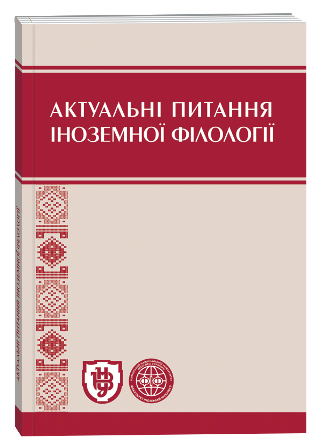MEDITATIVE DISCOURSE AS A VARIETY OF AUTHOR’S ESOTHERIC DISCOURSE: STRUCTURAL-PRAGMATIC ASPECT
DOI:
https://doi.org/10.32782/2410-0927-2021-14-3Keywords:
discourse, esotheric discourse, meditative discourse, incentive constructions, repetition, pragmaticsAbstract
The article is devoted to the analysis of the structural-pragmatic aspect of meditative discourse. The purpose of our study is to highlight the structural and pragmatic features of meditative discourse as a kind of esoteric discourse. Meditative discourse in its structural and pragmatic aspect has not yet been of interest to linguists, which, in fact, constitutes the novelty of our study. The methodological basis of the work is based on a complex combination of general scientific (induction, deduction), empirical-theoretical (synthesis, analysis) and linguistic methods (pragmatic, contextualinterpretive, etc.). Central in esoteric discourse is the approach to the special worldview of the individual, whose priority is the spiritual meaning of life and the subordination of the phenomena of the material world to higher, invisible manifestations of true being. As a result, meditative discourse is characterized not only by specific themes, but also by structural and stylistic features of construction, which are both a means of pragmatic influence on the addressee. Since the author pursues only one goal – to awaken the reader and encourage self-immersion and self-knowledge, the texts of meditative works are permeated with incentive constructions with a clear pragmatic focus on changing the worldview and priorities of the individual. Motivational constructions are always structured and presented together with repetitions, alliteration/ assonance, enumeration, etc. We can say that the means of syntactic organization of meditative discourse perform both organizational (text-oriented) and pragmatic (reader-oriented) functions, in order to encourage a person to think and contemplate and, accordingly, implement the author’s plan to change the worldview of the addressee. Compiling a scheme that would depict the place of meditative discourse as a subspecies of esoteric discourse in the system of sacred discourses constitutes the perspective of the further research.
References
Арнольд И. В. Стилистика. Современный английский язык. Москва : Наука. 2002. 384 с.
Бехта І. А. Дискурс наратора в англомовній прозі. Київ : Грамота. 2004. 304с.
Бехта І. А. Функційно-прагматична дієвість тексту у світлі когніції й дискурсу. Людина. Комп’ютер. Комунікація : збірник наукових праць / за ред. О. П. Левченко. Львів : Видавництво Львівської політехніки. 2013. С. 99–103.
Бєлозьорова Ю. С. Когнітивно-дискурсивна концептуалізація часу в сучасній німецькій мові : автореф. дис. ... канд. філол. наук. Запоріз. держ. ун-т. Запоріжжя. 2005. 22 с.
Гарюнова Ю. О. Функціонування власних назв у кінокритичному дискурсі: “чиста” номінація і прецедентність. Вiсник Харкiвського нацiонального унiверситету iм. В. Н. Каразiна. 2011. № 963. Сер.: Філологія. Вип. 62. С. 71–75.
Дмитриева О. А., Ермолаева Е. В. Типлогия хронотопа и учасников медитативного дискурса. 2015. URL: https://cyberleninka.ru/article/n/tipologiya-hronotopa-i-uchastnikov-meditativnogo-diskursa/viewer
Ермолаева Е. В. Медитативный, магический, психотерапевтический и религиозный дискурсы в сопоставительном освещении. Филологические науки. Вопросы теории и практики. Тамбов. 2017. № 2 (68): в 2 ч. Ч. 2. С. 124–126.
Кусько Е. Я. Дикурс, дискурсная лингвистика, дискурсоведение: тенденции развития. Форма, значение и функции единиц языка и речи : материалы докл. Междунар. науч. конф. Москва. 2002. Ч. 1. С. 37–39.
Мартинюк А. П. Словник основних термінів когнітивно-дискурсивної лінгвістики. Харків. 2011. 196 с.
Петрик Т. В. Ченнелінг у системі сакральних дискурсів. Вісник ЛНУ імені Тараса Шевченка. № 6 (289). Ч. І. 2014. С. 72–79.
Сунгуртян К. К. Лингвориторические средства выражения антропоцентризма врусском и переводном эзотерическом дискурсе : автореф. дис. на соиск. уч. ст. канд. филол. наук: спец. 10.02.19. «Теория языка». Краснодар. 2007. 23 с.
Mello de, Anthony. Awareness: the Perils and Opportunities of Reality. New York. 1992. 185 p.
Mello de, Anthony. Contact with God. New York. 2003. 224 p.
Mello de, Anthony. The Way to Love: Last Meditations of Anthony de. New York. 1995. 196 p.
Osho. A cup of tea. 1971. URL: https://www.oshorajneesh.com/download/osho-books/hindi-translations/A_Cup_of_Tea.pdf
Osho. Seeds of wisdom. 1994. URL: http://www.alaalsayid.com/ebooks/OSHO%20pdf/Seeds%20of%20Wisdom.pdf







